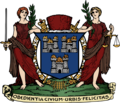The protest
On Saturday, 22 May 1971 the group met at Connolly Station in Dublin and then travelled to Belfast in Northern Ireland to purchase contraceptives, which were banned in the Republic of Ireland. [2] The IWLM members were divided about who should go to Belfast. Some members thought that single women should not go because "buying contraception implied they were having sex before marriage." [3]
Contraception in the Republic of Ireland had been illegal since 1935 under the 1935 Criminal Law (Amendment) Act, [4] and while contraception was legal in Northern Ireland it was restricted, so the women involved could not get the pill without a doctor's prescription (even though they tried). [5] The women bought condoms and spermicide jelly, and instead of buying the pill they bought hundreds of packets of aspirin, as they realized that the majority of the Customs officials would not know what the pill would look like. [6] [2] They were followed by television crews from the United States and Japan, as well as Ireland. [5]
On arrival back at Connolly Station, there were demonstrating protesters waiting for them. [7] At customs, the women involved loudly declared what they had purchased and refused to hand over the contraceptives. [5] Some women publicly swallowed the aspirin in defiance of the law, pretending that they were the pill. [6] Others waved the contraceptives in the air as they passed through the station. [7]
Women who were involved with the Contraceptive Train put themselves at risk of being detained or prosecuted for bringing birth control into Ireland. [8] They also risked social stigma from their families and friends. [9]
This page is based on this
Wikipedia article Text is available under the
CC BY-SA 4.0 license; additional terms may apply.
Images, videos and audio are available under their respective licenses.

